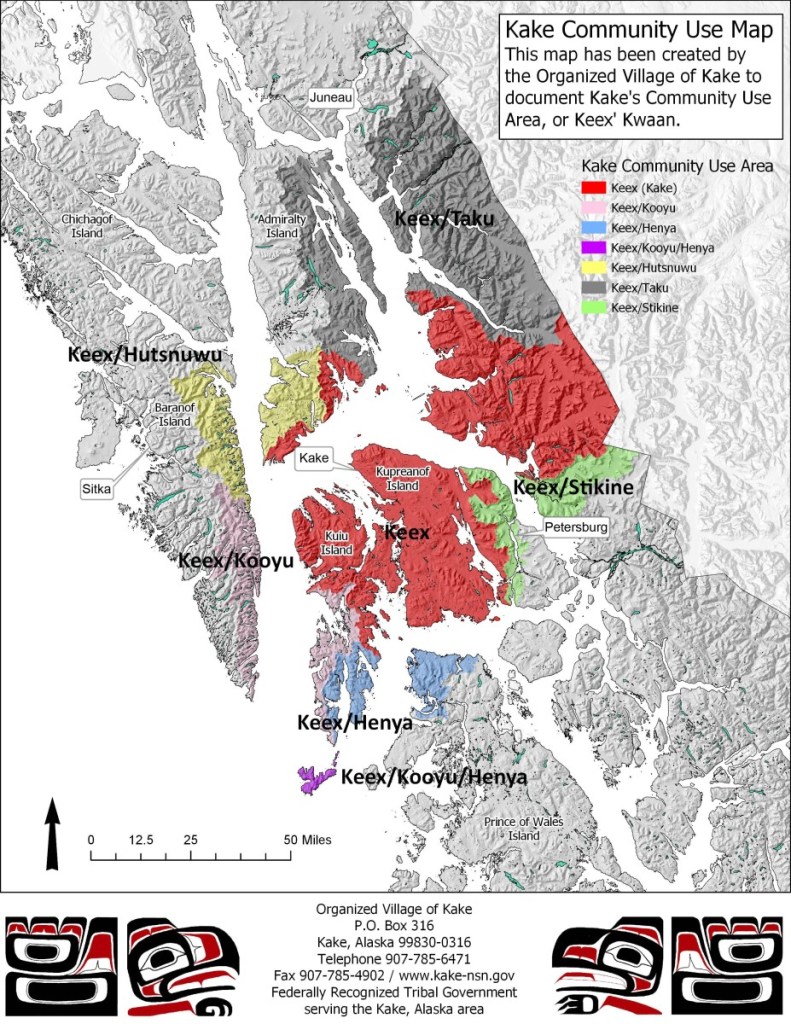Kake Climate Partnership: co-producing climate research in Southeast Alaska
Introduction
As a postdoctoral fellow at ACCAP, Elizabeth Figus studied co-production in climate change research. Elizabeth is a founding member of the Kake Climate Partnership (Figure 1), which was formed in 2020 between the Organized Village of Kake, Kake Tribal Corporation, the City of Kake, and ACCAP.
Kake is situated in the heart of Southeast Alaska, at the confluence of three major bodies of water: Frederick Sound, Chatham Strait, and Keku Strait. The Tribe and community in Kake are concerned about how the saltwater and freshwater environments surrounding their traditional food harvesting areas are impacted by global climate change and by pollution. The Kake Climate Partnership aims to produce tangible benefits for residents through co-produced climate research that strengthens food sovereignty and food security in the Kake Community Use Area (Figure 2).
The Kake Climate Partnership supports locally-led ocean and stream monitoring projects that blend baseline climate and pollutant data collection with interviewing Elders to document environmental change over time.
Partners created a set of explicit Principles and Expectations to guide the work of the Partnership. The Principles and Expectations document stipulates broad ideas (e.g., shared values among partners) and narrowly defined responsibilities (e.g., who is responsible for record-keeping). Workforce development is a top priority of the Kake Climate Partnership, so all field projects are centered around paid work opportunities, mentorship, and training for local residents and Tribal members.


Next Steps
In Oct. 2023, this project was extended through funding by the USGS Climate Adaptation Science Center (CASC). Now an independent contractor, Figus is continuing work with the Kake Climate Partnership on subsistence food security and is establishing a second climate adaptation co-production partnership in Hoonah, Alaska to expand regional capacity.
Additional work will create a practical guidance framework for implementing co-production research, regional networking, and capacity building that can be applied and tested in meeting climate adaptation challenges related to research and planning in Indigenous communities in other regions (Ellam Yua et al., 2021). We are also advancing the science of the evaluation of climate co-produced research and partnering with Indigenous evaluators to explore and develop robust metrics and processes for evaluation of co-produced research in Indigenous communities.
Resources
Learn more about ocean monitoring in Kake by watching this film by Talia Davis. You can also read Talia’s undergraduate thesis and her poster about ocean monitoring during the 2020 season (see links below).
Publications and Outreach
Land Acknowledgement
Everywhere we live and work is Native land. We recognize, appreciate, and honor Indigenous peoples and their past, present, and future land stewardship. The work of the Kake Climate Partnership has taken place on the unceded territories of many Indigenous peoples within the boundaries currently recognized by the United States Federal government as the State of Alaska. Most of our field research work has taken place on Tlingit Aani, in the unceded territories of the Keex’ Kwaan Tlingit people in Southeast Alaska.

Funding
Elizabeth is funded by ACCAP NOAA RISA award NA16OAR4310162, USDA National Institute of Food and Agriculture (NIFA) Hatch project 1018914, and USGS Climate Adaptation Science Center (CASC) G22AC00604.
The Kake Climate Partnership has been supported by the following funding sources: ACCAP award NA16OAR4310162; USDA NIFA Hatch project 1018914; USGS Climate Adaptation Science Center (CASC) G22AC00604; EPA Indian General Assistance Program (IGAP; CFDA 66.926) at the Organized Village of Kake (OVK); Bureau of Indian Affairs Tribal Resilience Ocean and Coastal Management Planning Grant (#A20AP00144, held by OVK); NOAA Sea Grant Community Engaged Internship program; NOAA Hollings Preparation Program; and UAF Undergraduate Research and Scholarly Activity program. The University of Alaska is an AA/EO employer and educational institution and prohibits illegal discrimination against any individual: http://www.alaska.edu/nondiscrimination.
The Kake Climate Partnership has also been supported by donations of time from: the Organized Village of Kake; the Kake Tribal Corporation; the City of Kake; the Alaska Youth Stewards program (funded through the United States Forest Service, the Sustainable Southeast Partnership, and SEALASKA Corporation).
